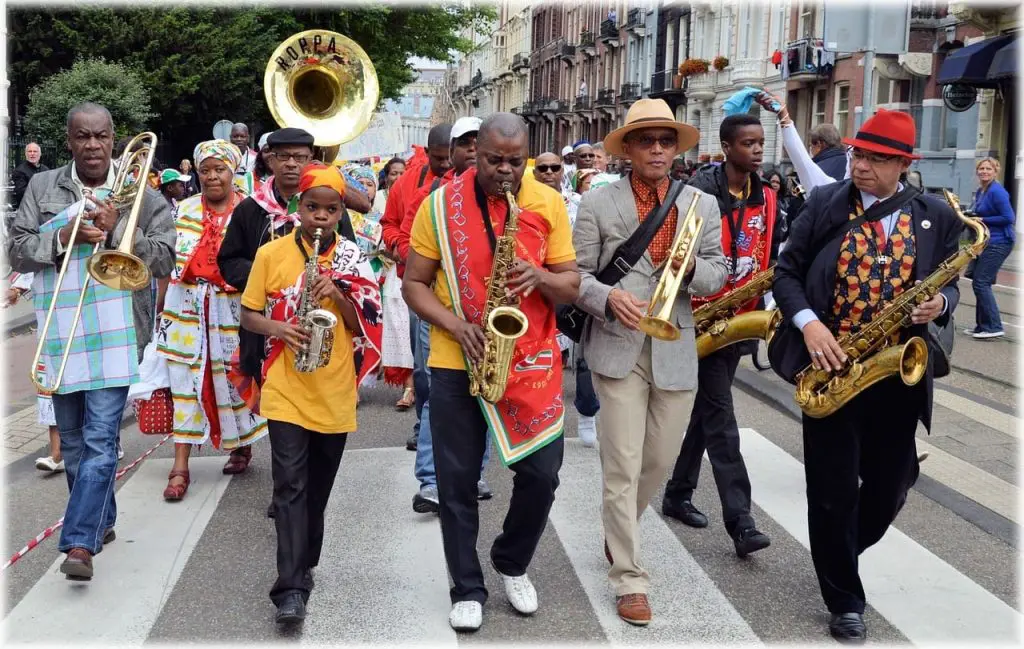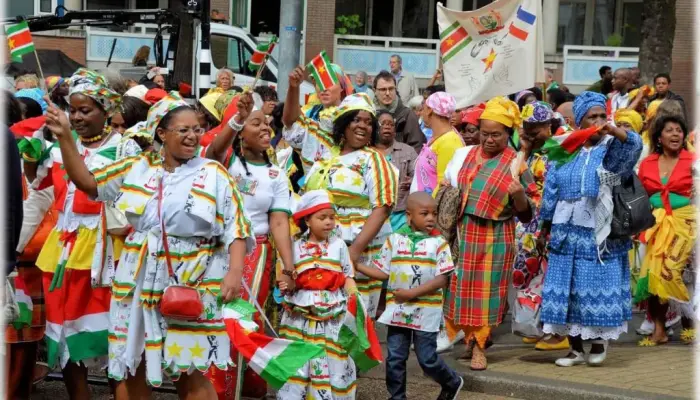June 30 – July 1
Paramaribo, Suriname
Keti Koti is one of the most important national holidays in Suriname, with origins that date back to a distant past. Its name in Sranan Tongo, one of the country's languages, means "broken chains." It marks the abolition of slavery in what is now the Republic of Suriname on July 1, 1863. Before this historic event, hundreds of thousands of enslaved people brought from Africa worked under inhumane conditions on the colony's plantations, subjected to brutal punishments and the whims of their masters. For many years, their struggle for freedom manifested in rebellions, escapes, and the creation of communities of runaway slaves known as Maroons.
History of Keti Koti
The Freedom Festival, Keti Koti, in Sranan Tongo means "broken chains." It is an annual celebration in Suriname commemorating the abolition of slavery in 1863. This festival is a time of reflection and remembrance as the nation honors the resilience and strength of its ancestors.
The history of Keti Koti dates back to 1863, when the Dutch government, after many years of pressure from abolitionists, finally announced the abolition of slavery in Suriname. However, the freed slaves were not granted full freedom until 1873, when the ten-year transition period known as the "apprenticeship system" ended. Despite the hardships and injustices of the past, Keti Koti has become a symbol of hope and resilience for the Surinamese people.
Celebration in 2024
In 2024, the celebrations for the 161st anniversary of the abolition of slavery in Suriname will take place on June 30 and July 1. The epicenter of the festivities will traditionally be the country's capital, Paramaribo. In addition to official events, the city's central streets will turn into a huge festive playground.
Event program

The festivities will open with a grand carnival parade in the center of Paramaribo. Hundreds of brightly decorated floats, dancers in elaborate costumes, and musical groups will parade down the main street, Waterkant. Ethnic communities and delegations from different regions of Suriname will also participate in the procession.
A large fair with stalls selling national dishes and souvenirs will be set up on the banks of the Suriname River. Craftsmen will showcase their skills in weaving, wood carving, and other forms of decorative arts.
On the evening of July 1, a grand fire show, torchlight procession, and fireworks display will be held on the Paramaribo city beach. Popular Surinamese artists performing Caribbean styles like calypso, kompa, and kaseko will take the stage.
What to expect at this festival
Keti Koti is a colorful festival filled with music, dancing, food, and cultural activities. Celebrations usually begin on the evening of June 30 with a vigil at the monument to the freed Africans in Paramaribo.
On the morning of July 1, an official Keti Koti ceremony will be held at the same location. The ceremony includes speeches by government officials, traditional African drumming and singing, and a wreath-laying ceremony.
Throughout the day, numerous events and activities take place across the country. These include street parades, concerts, dance performances, and cultural exhibitions. Many people also wear traditional African clothing to celebrate the festival.
How to get there
You can reach the capital of Suriname by various means. The country's main aviation hub, Johan Adolf Pengel International Airport, is located 45 km from Paramaribo. Regular flights are available from Amsterdam, Miami, Curaçao, and several other Caribbean cities.
For those traveling by land from French Guiana, Guyana, or Brazil, the most convenient way to reach Paramaribo is via the highways leading to the border crossings at Albina and South Drain. Buses are also available from these countries. The distance to the French Guiana border is about 200 km.
Another option is to arrive in Paramaribo by ferry along the Suriname River from the town of New Amsterdam, located 25 km away.
Tips for visitors
Keti Koti is the perfect time to explore the vibrant culture of Suriname. It is recommended to book hotels or apartments in Paramaribo in advance, as prices rise and many places will be occupied during the festive days.
For ease of participation in the festivities, it is best to purchase affordable tours with transfers from the hotel and back, offered by local tour companies. You can also hire a taxi or rent a car, but be prepared for traffic jams and parking issues.
What to eat and drink
During Keti Koti, a wide variety of food and drinks are offered. Some of the most popular festive dishes include:
- Pom – a dish made from sweet potatoes with coconut and spices.
- Baka bana – a fried plantain dish.
- Moksi meti – a rice dish with chicken, vegetables, and spices.
- Heri heri – fish and root vegetables in a spicy peanut sauce.
Make sure to bring sunscreen and lightweight clothing made from natural fabrics – early July in Paramaribo is very hot and humid. Be sure to try the national cuisine of Suriname, which blends African, Indian, Indonesian, and European culinary traditions.
Other festivals in Suriname
If you can't make it to Keti Koti, you can always try to attend the New Year's celebration at Pagara Estafette.
What to do in Suriname
Suriname is a beautiful and diverse country with a rich history and culture. Some of the main tourist attractions include:
- The historic inner city of Paramaribo – a UNESCO World Heritage Site known for its colorful colonial architecture.
- Brownsberg Nature Park – a lush tropical forest with hiking trails, waterfalls, and wildlife.
- Commewijne district – home to several former plantations, now museums, offering a glimpse into Suriname's colonial past.
- Galibi Nature Reserve – a nesting site for sea turtles where you can see turtles nesting and laying eggs.
Flights to Suriname
The most direct routes to Suriname from major international hubs include:
- From London: KLM Royal Dutch Airlines offers flights from London Heathrow Airport (LHR) to Paramaribo International Airport (PBM) via Amsterdam.
- From Miami: Surinam Airways offers direct flights from Miami International Airport (MIA) to Paramaribo International Airport (PBM).
Upon arrival at Paramaribo International Airport, you can take a taxi to your destination.
Keti Koti is a vibrant and unique celebration, the perfect time to immerse yourself in the multifaceted culture of Suriname. Come and share the joy of freedom with its residents!
